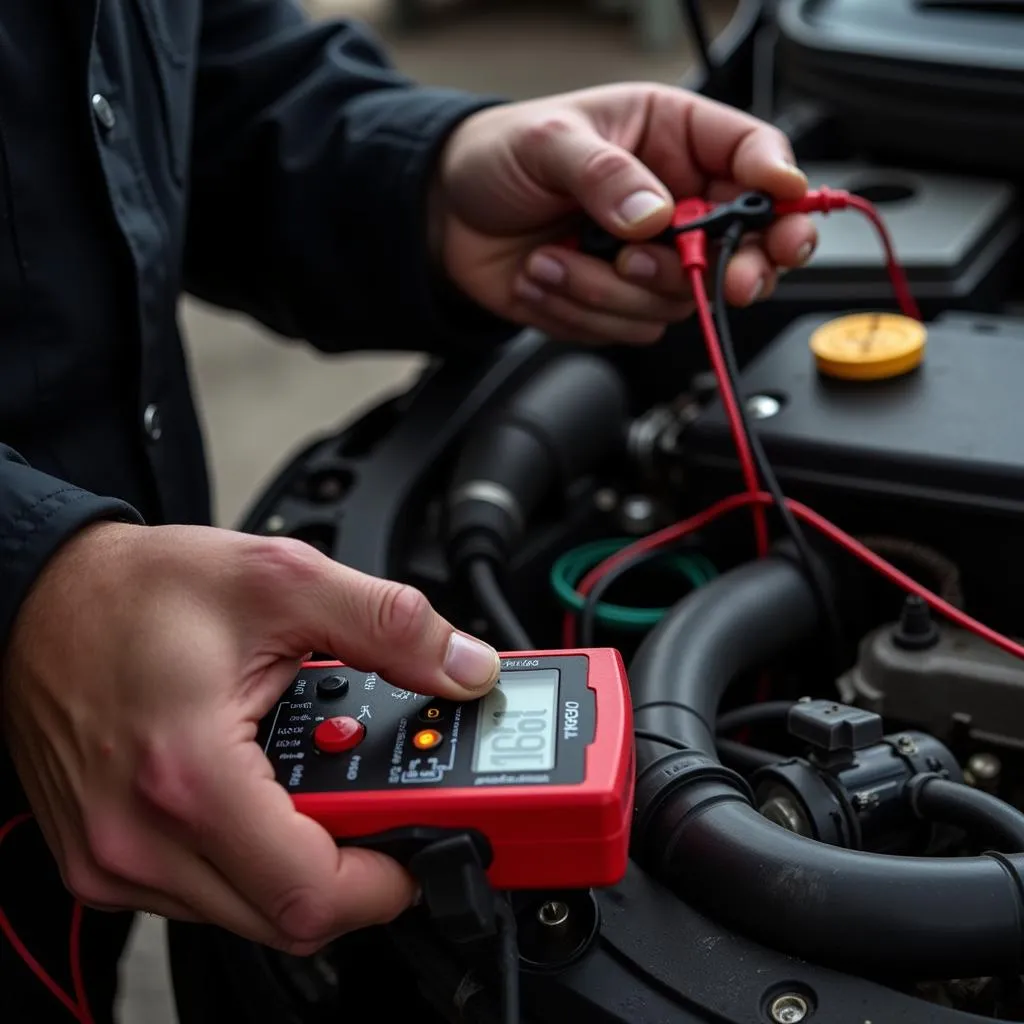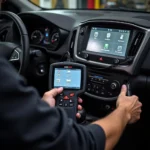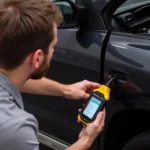“Car cranks but doesn’t start” is a common issue that many car owners face. You turn the key, hear that familiar cranking sound, but the engine refuses to roar to life. This frustrating problem can stem from various factors, leaving you stranded and searching for answers. This comprehensive guide will delve into the common causes, troubleshooting steps, and solutions for a car that cranks but won’t start.
Understanding the Cranking Process
Before we dive into the causes, let’s quickly understand what happens when you crank your car. When you turn the key, the starter motor engages with the engine’s flywheel, turning the crankshaft and pistons. This process draws a mixture of air and fuel into the cylinders and initiates the combustion cycle. If any element within this sequence fails, the engine won’t start.
Common Causes and Solutions
Here are some of the most common reasons why your car cranks but won’t start:
1. Battery Issues
While the starter motor gets your engine cranking, a weak or dead battery is often the culprit behind a no-start situation.
Symptoms:
- Slow cranking speed
- Dim headlights and interior lights
- Clicking sound when turning the key
Solutions:
- Jump-start your car: Use jumper cables and a healthy battery from another vehicle to jump-start your car.
- Check battery terminals: Ensure they are clean, tight, and free of corrosion.
- Test your battery: Use a multimeter to check the battery voltage. A fully charged battery should read around 12.6 volts.
- Replace the battery: If the battery is old or fails the voltage test, it’s time for a replacement.
 Testing Car Battery Voltage
Testing Car Battery Voltage
2. Faulty Starter Motor
If your battery checks out fine but the engine still won’t start, a faulty starter motor could be the issue.
Symptoms:
- Clicking sound when turning the key, but the engine doesn’t crank
- Grinding noise during cranking
Solutions:
- Tap the starter motor: Sometimes, a gentle tap on the starter motor can dislodge a stuck component and get it working temporarily.
- Check starter connections: Make sure the connections to the starter motor are secure and free of corrosion.
- Replace the starter motor: If tapping and checking connections don’t help, the starter motor likely needs replacement.
3. Ignition System Problems
The ignition system is responsible for creating the spark that ignites the air-fuel mixture in the engine cylinders. Problems here can prevent your car from starting.
Symptoms:
- Engine cranks but doesn’t fire
- Backfiring sound
- Smell of gasoline
Solutions:
- Check spark plugs: Inspect spark plugs for wear and tear, damage, or fouling. Replace if necessary.
- Inspect ignition coils: Ensure ignition coils are properly connected and functioning correctly.
- Test the ignition system: Use a spark tester to verify if the spark plugs are receiving sufficient spark.
- Replace faulty components: If any component within the ignition system, such as the crankshaft position sensor or ignition module, is malfunctioning, it will need replacement.
4. Fuel System Malfunctions
Without the proper air-fuel mixture, your engine won’t ignite. Several fuel system issues can disrupt this balance.
Symptoms:
- Engine cranks but doesn’t start, especially after sitting for a while
- Smell of gasoline
- Low fuel pressure
Solutions:
- Check fuel level: Ensure you have enough fuel in the tank.
- Inspect fuel pump: Listen for the fuel pump priming when you turn the key to the “on” position. If you don’t hear it, the fuel pump may be faulty.
- Check fuel filter: A clogged fuel filter restricts fuel flow. Replace the filter if necessary.
- Inspect fuel injectors: Clogged or malfunctioning fuel injectors can disrupt the air-fuel mixture.
Other Potential Causes
While less common, other potential causes for a car cranking but not starting include:
- Immobilizer System Malfunction: If the immobilizer system, which prevents theft, malfunctions, it can prevent the engine from starting.
- Faulty ECU: The Engine Control Unit (ECU), the car’s brain, can sometimes fail, disrupting engine operation.
- Vacuum Leaks: Leaks in the vacuum system can disrupt the air-fuel mixture and prevent starting.
- Timing Belt/Chain Issues: A broken or slipped timing belt or chain can disrupt valve timing, preventing the engine from starting.
Conclusion
A car that cranks but doesn’t start can be a frustrating and inconvenient issue. However, by understanding the common causes outlined in this guide, you can effectively troubleshoot the problem and get your car running again. If you’re unable to diagnose and fix the problem yourself, it’s best to seek assistance from a qualified mechanic. They have the expertise and tools to diagnose complex car issues and provide the necessary repairs.
FAQs
Q1: Why does my car crank slowly but not start?
A1: Slow cranking often indicates a weak or dying battery. Try jump-starting your car or testing the battery voltage.
Q2: What does it mean if my car makes a clicking sound when I try to start it?
A2: A clicking sound could indicate a dead battery, a faulty starter motor, or a problem with the electrical connections.
Q3: Can a bad alternator cause my car not to start?
A3: While a bad alternator can drain your battery, it usually won’t prevent the car from starting unless the battery is completely dead.
Q4: How can I tell if my fuel pump is bad?
A4: Listen for the fuel pump priming (a humming sound) when you turn the key to the “on” position. If you don’t hear it, the fuel pump may be faulty.
Q5: Should I try to fix a car that cranks but doesn’t start myself?
A5: If you’re comfortable with car mechanics and have the necessary tools, you can try basic troubleshooting. However, if you’re unsure or the problem seems complex, it’s best to consult a qualified mechanic.
For more information on car starting problems and other related issues, you can check out our article on car not starting but battery is fine.
Need further assistance with your car troubles? Our team of expert technicians is here to help!
Contact us via:
WhatsApp: +1(641)206-8880
Email: cardiagtechworkshop@gmail.com
Visit us at: 276 Reock St, City of Orange, NJ 07050, United States.
We offer 24/7 customer support to get you back on the road as quickly as possible.


